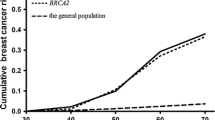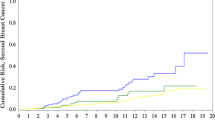Abstract
Purpose
It is not known whether the risk of breast cancer among BRCA1 and BRCA2 mutation carriers after age 60 is high enough to justify intensive screening or prophylactic surgery. Thus, we conducted a prospective analysis of breast cancer risk in BRCA1 and BRCA2 mutation carriers from age 60 until age 80.
Methods
Subjects had no history of cancer and both breasts intact at age 60 (n = 699). Women were followed until a breast cancer diagnosis, prophylactic bilateral mastectomy or death. We calculated the annual cancer rate and cumulative incidence of breast cancer (invasive and in situ) from age 60 to age 80. We assessed the associations between hormone replacement therapy, family history of breast cancer and bilateral oophorectomy and breast cancer risk.
Results
Over a mean follow-up of 7.9 years, 61 invasive and 20 in situ breast cancers were diagnosed in the cohort. The mean annual rate of invasive breast cancer was 1.8% for BRCA1 mutation carriers and 1.7% for BRCA2 mutation carriers. The cumulative risk of invasive breast cancer from age 60 to 80 was 20.1% for women with a BRCA1 mutation and was 17.3% for women with a BRCA2 mutation. Hormone replacement therapy, family history and oophorectomy were not associated with breast cancer risk.
Conclusions
Findings from this large prospective study indicate that the risk of developing breast cancer remains high after age 60 in both BRCA1 and BRCA2 mutation carriers. These findings warrant further evaluation of the role of breast cancer screening in older mutation carriers.


Similar content being viewed by others
Data availability
The data that support the findings of this study are available from the corresponding author upon reasonable request.
Code availability
Available from the corresponding author upon reasonable request.
References
(NCCN) N.C.C.N. (2020) Genetic/familial high-risk assessment: breast and ovarian. Version 1.2020. https://www.nccn.org/professionals/physician_gls/pdf/genetics_screening.pdf. Accessed 20 Jun 2020
Tilanus-Linthorst MM, Lingsma HF, Evans DG et al (2013) Optimal age to start preventive measures in women with BRCA1/2 mutations or high familial breast cancer risk. Int J Cancer 133:156–163
Lubinski J, Huzarski T, Byrski T et al (2012) The risk of breast cancer in women with a BRCA1 mutation from North America and Poland. Int J Cancer 131:229–234
(OBSP), O.B.S.P. (2015) Guidelines Summary, 2015. https://www.cancercareontario.ca/sites/ccocancercare/files/assets/OBSPGuidelinesSummary.pdf. Accessed 20 Jun 2020
(NICE), N.I.f.H.C.E. (2020) Familial breast cancer: classification, care and managing breast cancer and related risks in people with a family history of breast cancer. https://www.nice.org.uk/guidance/cg164/chapter/Recommendations. Accessed 20 Jun 2020
Paluch-Shimon S, Cardoso F, Sessa C et al (2016) Prevention and screening in BRCA mutation carriers and other breast/ovarian hereditary cancer syndromes: ESMO Clinical Practice Guidelines for cancer prevention and screening. Ann Oncol 27:v103–v110
Domchek SM, Friebel TM, Singer CF et al (2010) Association of risk-reducing surgery in BRCA1 or BRCA2 mutation carriers with cancer risk and mortality. JAMA 304:967–975
Gibreel WO, Day CN, Hoskin TL et al (2017) Mastectomy and immediate breast reconstruction for cancer in the elderly: a National Cancer Data Base Study. J Am Coll Surg 224:895–905
Sada A, Day CN, Hoskin TL et al (2019) Mastectomy and immediate breast reconstruction in the elderly: trends and outcomes. Surgery 166:709–714
Giannakeas V, Narod SA (2018) The expected benefit of preventive mastectomy on breast cancer incidence and mortality in BRCA mutation carriers, by age at mastectomy. Breast Cancer Res Treat 167:263–267
Kotsopoulos J, Gronwald J, Karlan BY et al (2018) Hormone replacement therapy after oophorectomy and breast cancer risk among BRCA1 mutation carriers. JAMA Oncol 4:1059–1065
Antoniou A, Pharoah PDP, Narod S et al (2003) Average risks of breast and ovarian cancer associated with BRCA1 or BRCA2 mutations detected in case Series unselected for family history: a combined analysis of 22 studies. Am J Hum Genet 72:1117–1130
Chen S, Parmigiani G (2007) Meta-analysis of BRCA1 and BRCA2 penetrance. J Clin Oncol 25:1329–1333
Kuchenbaecker KB, Hopper JL, Barnes DR et al (2017) Risks of breast, ovarian, and contralateral breast cancer for BRCA1 and BRCA2 mutation carriers. JAMA 317:2402–2416
van der Kolk DM, de Bock GH, Leegte BK et al (2010) Penetrance of breast cancer, ovarian cancer and contralateral breast cancer in BRCA1 and BRCA2 families: high cancer incidence at older age. Breast Cancer Res Treat 124:643–651
Møller P, Maehle L, Vabø A, Clark N, Sun P, Narod SA (2013) Age-specific incidence rates for breast cancer in carriers of BRCA1 mutations from Norway. Clin Genet 83:88–91
Evans DG, Harkness E, Lalloo F, Howell A (2014) Long-term prospective clinical follow-up after BRCA1/2 presymptomatic testing: BRCA2 risks higher than in adjusted retrospective studies. J Med Genet 51:573–580
Foulkes WD, Metcalfe K, Sun P et al (2004) Estrogen receptor status in BRCA1- and BRCA2-related breast cancer: the influence of age, grade, and histological type. Clin Cancer Res 10:2029–2034
Chiarelli AM, Blackmore KM, Muradali D et al (2020) Performance measures of magnetic resonance imaging plus mammography in the high risk Ontario Breast Screening Program. J Natl Cancer Inst 112:136–144
Stjepanovic N, Villacampa G, Nead KT et al (2020) Association of premenopausal risk-reducing salpingo-oophorectomy with breast cancer risk in BRCA1/2 mutation carriers: maximising bias-reduction. Eur J Cancer 132:53–60
Kotsopoulos J, Huzarski T, Gronwald J et al (2017) Bilateral oophorectomy and breast cancer risk in BRCA1 and BRCA2 mutation carriers. J Natl Cancer Inst 109:djw177
Acknowledgements
Steven A. Narod is the recipient of a Canada Research Chair (Tier I). Joanne Kotsopoulos is the recipient of a Canada Research Chair (Tier II).
Other members of the Hereditary Breast Cancer Clinical Study Group: Leigha Senter, Charis Eng Fergus Couch, Robert Fruscio, Jeffrey N. Weitzel Olufunmilayo Olopade, Christian F. Singer, Tuya Pal, Tomasz Huzarski, Cezary Cybulski, Kevin Sweet, Dana Zakalik, Marie Wood, Wendy McKinnon, Christine Elser, Georgia Wiesner, Eitan Friedman, Wendy Meschino, Carrie Snyder, Kelly Metcalfe, Aletta Poll, Ellen Warner, Raymond Kim, Rochelle Demsky, Peter Ainsworth, Linda Steele, Howard Saal, Kim Serfas, Seema Panchal, Carey A. Cullinane, Robert E. Reilly, Joanne L. Blum, Ava Kwong, Daniel Rayson, Teresa Ramón y Cajal, Jeffrey Dungan, Rinat Yerushalmi, Ophira Ginsburg, Intan Schraeder, Stephanie Cohen, Edmond Lemire, Stefania Zovato, Antonella Rastelli, Jacek Gronwald, Jeanna McCuaig, Beth Karlan, Louise Bordeleau.
Funding
This work was supported by the Canadian Institutes of Health Research (FDN 154275), Canadian Cancer Society Research Institute Grant (703058) and the Peter Gilgan Centre for Women’s Cancers at Women’s College Hospital, in partnership with the Canadian Cancer Society.
Author information
Authors and Affiliations
Consortia
Contributions
All authors contributed to the study conception and design. Material preparation, data collection and analysis were performed by NS, AE, SN and PS. The first draft of the manuscript was written by NS and all authors commented on previous versions of the manuscript. All authors read and approved the final manuscript.
Corresponding author
Ethics declarations
Conflict of interest
The authors declare that they have no conflict of interest.
Ethical approval
The study was approved by the Women’s College Hospital Ethics Board. The study was performed in accordance with the ethical standards as laid down in the 1964 Declaration of Helsinki and its later amendments.
Consent to participate
Informed consent was obtained from all individual participants included in the study.
Additional information
Publisher's Note
Springer Nature remains neutral with regard to jurisdictional claims in published maps and institutional affiliations.
The members of the Hereditary Breast Cancer Clinical Study Group have been listed in acknowledgements.
Rights and permissions
About this article
Cite this article
Stjepanovic, N., Lubinski, J., Moller, P. et al. Breast cancer risk after age 60 among BRCA1 and BRCA2 mutation carriers. Breast Cancer Res Treat 187, 515–523 (2021). https://doi.org/10.1007/s10549-020-06072-9
Received:
Accepted:
Published:
Issue Date:
DOI: https://doi.org/10.1007/s10549-020-06072-9




